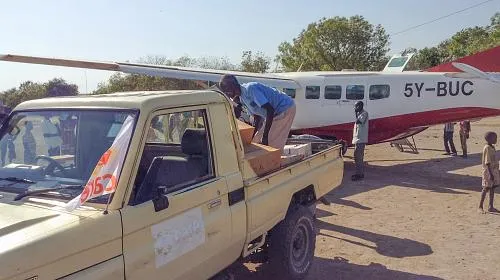JUBA (Feb. 17, 2014) – The South Sudan crisis will worsen unless relief organizations are able to deliver supplies before being cut off by the approaching rainy season, the humanitarian group CARE warned this week.
“The United Nations has activated the highest level of emergency for South Sudan and warned of a possible famine in 2015,” said Aimee Ansari, country director for CARE in South Sudan. “This is a wake-up call. If we are not able to act now and get relief flowing, the nightmare endured by South Sudanese families over the past few months will be only the beginning. We need to do everything we can to improve food security and help those suffering get back on their feet, and we need to start now.”
Continued fighting despite a cease-fire agreement on January 23 has made it difficult to reach many of the hundreds of thousands of people who have been displaced. CARE has moved back into areas hardest hit by the conflict as quickly as possible, providing lifesaving water and sanitation services as well as vital health and protection services for women and girls.
As security improves, CARE is bringing medicine to the worst-affected areas and conducting assessments so we can address urgent needs. Last week, CARE delivered medicines to health facilities in Unity and Jonglei states. CARE was able to land a chartered plane in Twic East County, an area of Jonglei where it has supported the health system for seven years and which was inaccessible to aid organizations until now. “We took in almost 1,000 kg of the most badly-needed medicines and talked to local officials and residents,” said Wouter Schaap, CARE’s assistant country director for South Sudan.
“The number one priority for everyone we talked to was food. They were already hurting from a bad harvest last year due to massive flooding from the White Nile River, and damaged and soggy pastures have wreaked havoc with the livestock they depend on,” Schaap said. “The people here have been virtually cut off from the outside world for two months. So they have exhausted their food stores. On top of that, there has been an influx of more than 31,000 people displaced by fighting in other parts of the state, boosting the local population by more than a third.”
“Many of these people are sleeping without any type of shelter or protection out in the bush along the swamps of the White Nile River,” Schaap said. “It is mostly women and children and malaria is taking a big toll, as are intestinal diseases and respiratory infections. The medicine we are bringing in will help, but these people need mosquito nets, they need food and they soon will need seed and hand tools in order to replenish their depleted food stocks, as well as vaccines for their livestock.” CARE is currently designing projects that will help meet these pressing needs. CARE water and sanitation programs are active in three states and nutrition activities are getting under way.
The country’s already fragile markets and food production systems have experienced major disruptions and the repercussions will be felt for months and years to come. “We will work to reduce the likelihood of a protracted food crisis that is almost assured if these people are left to fend for themselves,” said Ansari. “More than three-quarters of a million people have been separated from their homes and livelihoods. Their crops from last year’s late planting have withered and rotted in the fields, and their stocks from the main harvest were seriously depleted by the looting and destruction that has accompanied the violence. Their cattle have been driven off or are in poor condition. They are eating the seed stock that they should be planting.
“Given the continued insecurity and widespread destruction of infrastructure that has occurred, we face huge logistical challenges getting help to people,” said Ansari. “Once the rains start, by the end of April, those challenges will get much worse.”
About CARE:
CARE has been operating in Southern Sudan since 1993, initially providing humanitarian relief to internally displaced people in Western Equatoria. The signing of the Comprehensive Peace Agreement in 2005 allowed CARE to expand into Jonglei and Upper Nile States to support returnees from the refugee camps, and the organization has since broadened its operations to include development programs.
Media contacts:
- Dan Alder (Nairobi): + 254-0-706 223 998, dalder@ss.care.org
- Laura Sheahen (Atlanta): +1 404 667 8299, lsheahen@care.org
- Adel Sarkozi (Geneva): +41 793 580 713, sarkozi@careinternational.org
Keep learning:

